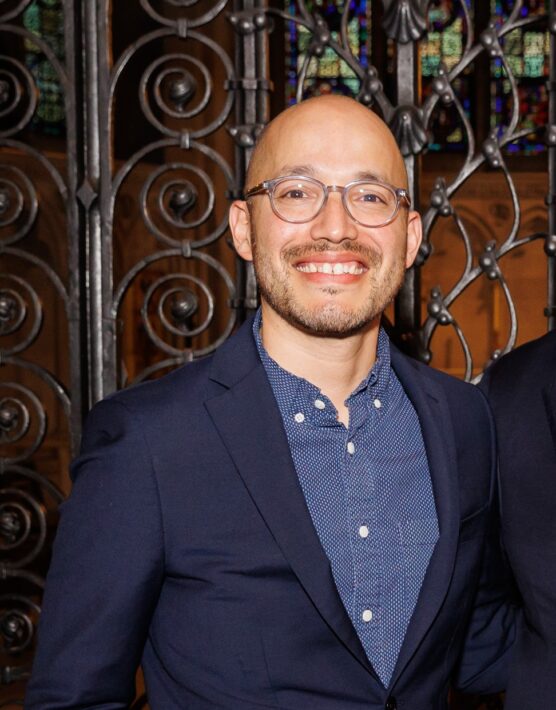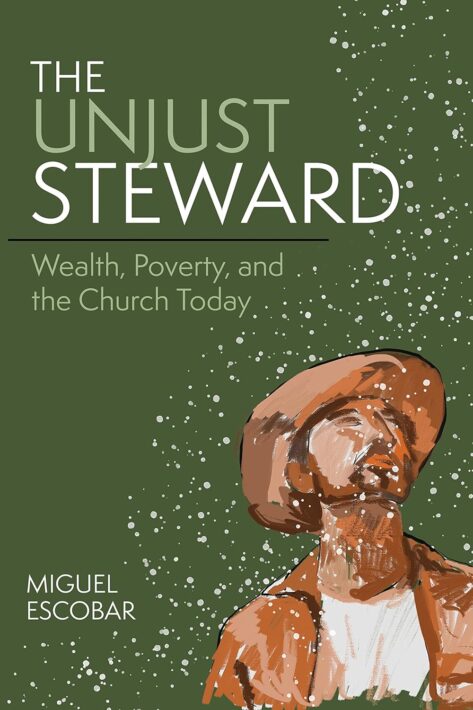Miguel Escobar is director of strategy and operations at Episcopal Divinity School in New York City. He is also a writer whose work explores Christianity’s complicated and conflicted relationship with money, wealth, and poverty. His book is The Unjust Steward: Wealth, Poverty and the Church Today.
We have the honor of partnering with Miguel on a few exclusive Faith and Money Network events in 2024. On April 24, we are hosting a Zoom webinar, where together we’ll explore the themes of Miguel’s book. You can register for this free event and learn more here. Then in October, Miguel will join us at The Festival Center for a live seminar that expands on the April conversation, followed by a Spanish-language chat with the author.
Read our recent conversation with Miguel, and then register for the April webinar — you won’t want to miss these events.
This interview has been edited for length and clarity.
Brittany Wilmes, Faith and Money Network: Tell me your story. How did you come to the work that you do today?
Miguel Escobar: I grew up in Texas, in a small town north of San Antonio that was theologically and politically very conservative. I was a gay Latino kid, and I always felt a little out of place. That experience, though, made me fascinated with what was going on in terms of Christianity and politics in the United States. I think even then I understood that there was a movement happening.

I was raised Roman Catholic. When I went to college, I really fell hard for the academic side of theology. I was particularly interested in social justice movements and Latin American liberation theology. I had the great privilege of studying in Mexico for six months, living with the Sisters of Divine Providence.
I got to see the way in which the sisters combined workshops on basic faith practices, with issues like personal finance or empowerment workshops for women experiencing domestic abuse. So I clearly saw the linkage between faith, financial empowerment, and one’s own agency — it was quite a significant experience for me.
My own grandparents were Roman Catholic migrant farm workers who really struggled with poverty. One of the earliest impressions for me was that the church was a present institution in their lives in a positive and helpful way for them.
So, afterwards, I went to Union Theological Seminary and continued my studies and while there became an Episcopalian. I’ve always felt connected to poor congregations, and I joined the Episcopal church through a small parish in West Harlem that’s very social-justice focused and also very poor.
Today I’m a member of and am being ordained through San Andres Episcopal Church, which is a Spanish-speaking, majority immigrant parish in Brooklyn. It’s a small congregation — a really beautiful community of people.
And then through all of this, I’ve been working for the Episcopal Church in a variety of national churchwide office positions.
Wilmes: How did you come to write The Unjust Steward?
Escobar: I was working for the Episcopal Church Foundation (ECF) that works with vestries and church leaders on areas of general leadership, but particularly on questions around finance. I have a theological degree that focused a lot on Biblical studies, and I was struck that there was this big gap between how the Gospels and early theologians talk about money and then the very practical, business-oriented manner in which we teach congregations and rectors to think about money.
It’s almost as though we put on two different hats, even in the same meeting. When church leadership talks about money in the context of programs, it’s all about generosity and service, and then when we bring out the financial report, it gets very formal, and it’s almost as though the speaker is two different people.
There is this whole developed doctrine of stewardship within American Christianity that really frames how we talk and think about money. Not many people have ever really scratched beneath the surface of this doctrine.
I was in a national position at ECF for seven years, and ever since then, I’ve been wrestling with and thinking about this gap between how the New Testament talks about money, and how we in American Protestant Christianity think and talk about it.
Wilmes: What themes and thinkers does the book explore?
Escobar: It’s centered around the issue of stewardship. While I was at ECF, I did a lot of presentations on stewardship. Because of my educational background, I was always interested in the Biblical examples that were used. There’s often the line from Genesis that says we have to be “stewards of the earth.”
I was constantly noticing that none of the stories about stewards from the New Testament were ever used, and there’s a reason for that. Stewards, in the Gospel of Luke particularly, are not positive characters.

The parable of the unjust steward is famously one of oppression. The steward is always the foil to Jesus’ extravagant generosity. It’s remarkable that when we talk about stewardship, we don’t bring up these other examples from Jesus’ time.
I began to read about early Church thinkers like Basil of Caesarea, who was writing in the fifth century. He interpreted the parable of the unjust steward in a really interesting way. His point was that the church was supposed to use its wealth and resources to be stewards of humanity.
He was writing in the context of a serious famine, and he was critiquing the wealthy for keeping hold of their wealth and not sharing their money for food relief and aid. His understanding was that our stewardship is of people — to aid communities and those who are struggling.
This is generally pretty different from a self-directed fundraising campaign as we interpret stewardship so often now.
Wilmes: What has been the most surprising or enlightening to you as you have shared the book with others?
Escobar: I am interested in this topic because I think about money all day. Like we all do, I have a relationship with money. I think about my budget, about what I can afford, what I can’t afford, I think about wanting to afford something and then I wonder if that is a good thing. Like everyone, I have a complicated relationship with money.
One of the reasons that I wrote this book is because I wanted to explore that for myself, but I have been pleased that it really is a topic that resonates with so many people. I think that most of us have a sense that Jesus was much more radical on issues of money than what we’ve heard from the pulpit or the church or from others.
While reading and presenting from this book, I’ve been struck by how deep the interest has been in this material. I’ve spoken with a lot of congregations and have witnessed the sincerity and the intensity of interest from people who want to come to have a more reconciled sort of relationship with their money.
Wilmes: What can FMN members expect at the April webinar and/or October seminar?
Escobar: One of the core traditional Christian ideas about money is that it is a neutral tool that we can use in one direction or another. It’s not necessarily a thing that is inherently good or bad.
But there were a lot of early church thinkers who were contesting that idea all along. They were saying that money is a tool, but a very dynamic one that seems to affect people in a different way. People like Basil of Caesarea compared money to powerfully addictive medicine. You can use it to alleviate suffering, but it’s something that we need to be careful with, because it has addictive qualities.
What we’ll be doing in these sessions is looking at how people in the Gospel through the fifth century wrestled with questions like: What is money? What is it useful for in terms of our faith lives? What are our expectations around it?
Wilmes: Is there anything else you would like to share as an invitation for these upcoming conversations?
Escobar: The other theme for the book that we will explore is the idea of how a church that begins with Jesus telling followers to divest from their money ends with theological justifications for holding vast, immense wealth itself. By the end of the sixth century, the church is a very wealthy institution.
Part of writing this history was my attempt to understand how the church as an institution gradually redirected funding or donations from the poor to itself. By the time of Augustine, he’s preaching to the wealthy and says, “I know you make donations to the poor of our city, but what about your bishop and his coffers?”
You really see this movement from giving one’s wealth to the poor to giving one’s wealth to the “holy poor” — Christian monks and nuns — and then to the institution of the church itself by telling believers, you’re making holy use of your wealth by giving it to the church, which is doing holy things.
There’s a whole line of thought where you see the institution stepping in and justifying the redirection of wealth toward itself. I think as Christians, we really need to understand that story.